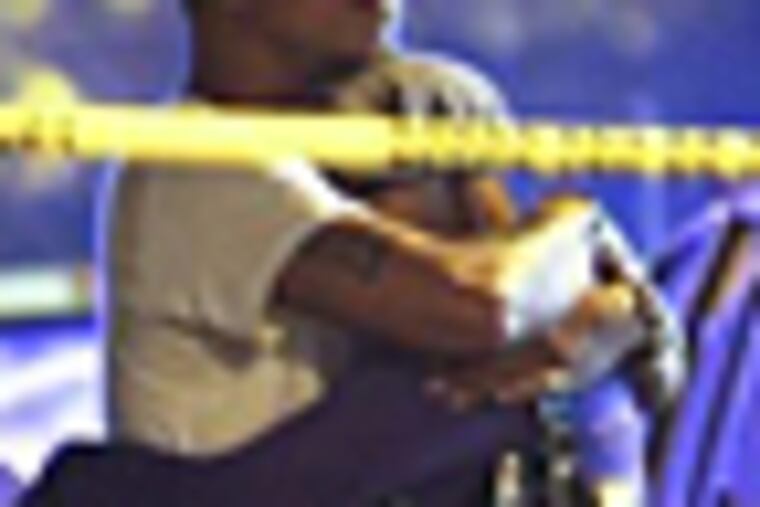Community desensitized to violence that has torn up neighborhoods
ON A WARM spring night, a boy no older than 5 sauntered onto his parents' porch about 10 p.m. as cops swarmed the family's Grays Ferry block, investigating a quadruple shooting that left a young man dead and three other people, including a pregnant woman, injured. Before being hushed by his parents, the boy peeked over the wrought-iron fence and formed a gun with his tiny thumb and forefinger, already much too aware of the violent city around him.

ON A WARM spring night, a boy no older than 5 sauntered onto his parents' porch about 10 p.m. as cops swarmed the family's Grays Ferry block, investigating a quadruple shooting that left a young man dead and three other people, including a pregnant woman, injured.
Before being hushed by his parents, the boy peeked over the wrought-iron fence and formed a gun with his tiny thumb and forefinger, already much too aware of the violent city around him.
"I heard the gunshots," the boy said, motioning as if he were firing a handgun. "It was like, 'Bang, bang, bang.' "
In addition to that May 22 killing of 24-year-old Adib Smith on Etting Street near Dickinson, the neighborhood has been the scene of two other homicides this year and shootings that wounded seven people.
The violence reflects a spike in homicides and shootings in Philadelphia this year, leaving communities feeling vulnerable and afraid, wondering when the next bullets will fly.
About three blocks from where Smith was gunned down, Clarice Douglas, 45, a mother of three, was killed when she was hit in the head by a stray bullet April 20, trying to get to her porch to seek refuge from a shootout between two men running along Corlies Street near Dickinson.
Hakeem Burley, 23, was wounded in the shootout in which he allegedly was involved with Shekinah Williams, 28. Burley was arrested, but Williams remains at-large.
About five blocks away on March 24, Damon Stafford, 21, was shot dead inside Twin Dragon, a Chinese takeout at 27th and Dickinson streets.
Police say the violence in neighborhoods has become so commonplace that many residents have mentally checked out, too desensitized to take an effective stand against the people who turn their communities into war zones and force their children to learn to duck at the sound of gunfire before they've even started school.
"We've morphed into a society where it's acceptable, almost, that gunshots go off, and you have your short-term bits of outrage and dismay, but ultimately you go about your business," Deputy Commissioner Richard Ross said.
David Kennedy, director of the Center for Crime Prevention and Control at New York's John Jay College of Criminal Justice, said one reason for gun violence is the mentality among many young men growing up in poverty-stricken, violence-choked neighborhoods that their days are numbered.
"Young men talk about not expecting to live past 25, and it shapes their behavior in all kinds of damaging ways," Kennedy said.
He added that it's virtually impossible to predict when violence will erupt.
"Things may be quiet today, but they can heat up for almost any reason tomorrow, and you can have a flurry of shootings back and forth between these two groups where it looks like the sky is falling," he said. "And in a very real way, it is."
Kennedy said that research in Chicago — a city that had a 60 percent uptick in homicides from January to April 2012 compared with the same period last year — has shown that the risk for neighbors who aren't involved in crime being killed is about the same as that of people who live in nonviolent communities.
But the peaceful people in bullet-torn communities feel as if they're held hostage by the bloodshed.